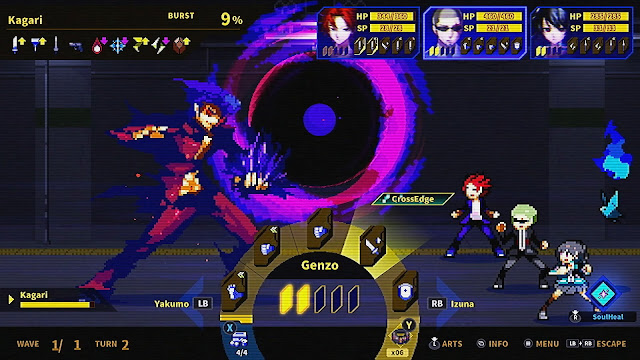SOULVARS by developer ginolabo and publisher Shueisha Games—Sony PlayStation 5 review
written by Nick with a copy provided by the publisher.
Estimated Reading Time: 5 minutes
SOULVARS is an interesting game. I had heard about it some time ago when it released to widespread acclaim in Japan as a mobile title. A lot of those elements translated well to the console release, but it’s not always a seamless transition and despite some deep systems that kept me interested in progression, there were some other aspects of SOULVARS I found somewhat lacking as well.
To start, SOULVARS just drops you into the fray. Now, some
games do that rather well, working in some lore and / or character building
during these encounters. Sometimes you get some flavor of the big bad bosses to
come, or some unlocked future power but there’s really none of that world
building in the beginning. You’re just tossed into a battle that does an adequate
enough job teaching you combat basics before moving you along into the story.
In some ways, this is the most frustrating aspect of SOULVARS
for me. There’s this promise of a bigger world, some interesting narratives of
how technology has ruined the world teased out and never fully realized.
Character interactions generally feel shallow. Most interactions are a line or
so. There’s plenty of background information that can be found in the menus,
and I read through it and liked the gist of what was there, but to have it
optionally presented in such a way really creates a strange disconnect from the
actual gameplay.
With this being a mobile port, I didn’t have particularly high
expectations of the overall presentation, but SOULVARS actually held up better
than I expected here. The sound and music were pedestrian and never
particularly memorable to me, but I enjoyed the pixelized style of the visuals.
That’s probably one of the aspects of SOULVARS that translates best to console.
It was likely a sharp design choice for smaller screens such as mobile phones,
but it still works well on the big screen. The environments simply ooze sci-fi
style, dripping with water, neon colors splashed against darker backdrops that
actually do far more to set up the atmosphere than the story or dialog ever did.
You can tell some interesting, terrible things happened by the bodies and
ruined technology found all over the place, it’s just never really explained
in-game in an interesting way.
There is a continually running clock as you navigate maps
and partake in different quests that hangs over your head as you play the game,
but most of the time my focus was on the combat. Here is where SOULVARS was
both most interesting to me, and somewhat disappointing. Maybe ‘disappointing’
isn’t quite the right word, but when I think of a game that advertises itself
as a ‘deckbuilder’ I think of actual cards. Maybe it’s just my years of playing
Magic: The Gathering and other card games that have my expectations slanted in
such a way, but SOULVARS has a different take on that term. So while it was not
what I expected, it was still a pretty deep system once I got into it.
That however, was another of the challenges – ‘getting into
it’. The tutorials explain the basics, but they are not the most easily
digestible introductions to gameplay I have ever seen. SOULVARS doesn’t feel
terribly welcoming to new players (though there are a plethora of options to
help tweak the experience to your liking at least). But with some time coupled
with trial and error, I definitely got into the combat more and found it pretty
rewarding once I knew what I was doing. I'm okay with how the combat system wasn't quite what I was expecting going into it, but it probably did make it a smidge more challenging for me to wrap my head around as well.
The ’deckbuilding’ is more of a concept that revolves around
action ‘types’. Different skills or pieces of equipment have action types
assigned to them. These then get put into a pool of actions that you draw at
random and then get to choose which to leverage. There’s an action point system
that lets you build up more attacks that can be strung together into combos. So
for example, if you equip a sword on your character, it can boost that
character’s stats, but it may also add a couple of sword slash actions, a
self-boosting action and a guard action, all of which may be drawn on your
turn. If you have a fire spell as a learned ability, casting it doesn’t hit the
enemy with that spell – it puts a fire ‘action’ into your pool that can be
drawn.
Technically all of this is explained at the start (and
thankfully there is a nice glossary built into the menu system that can help
you go over these types of systems in some detail), but I found it a bit unwieldy
at the start. It didn’t really sink in for me fully until I started moving
pieces of gear around on my characters and customizing them with special nodes
that can add abilities or additional action types to the gear.
Combinations and character progression were pretty fun. I
wonder though, if this worked better as a mobile game in part due to people
playing it in smaller, bite-sized chinks for time. My console experience
usually went like this: Fire up the game, enjoy exploring a new dungeon for a
bit, get some gear, tweak my characters – lather rinse and repeat. I think if I
was playing for ten or twenty minutes and then putting it down for several
hours, that would work better than sitting down and playing for nearly three
straight hours, followed by four later in the afternoon. A sense of repetition
and sameness started to set in during those longer sessions that I simply
couldn’t fully shake. I suspect a lot of this comes back to my feelings of
narrative shallowness during gameplay.
In the end, SOULVARS is an above-average turn-based JRPG
with some interesting ideas both narratively and in the gameplay. However, none
of it is overly approachable. The worldbuilding is there in the fringes, but
never fully surfaced during the game in a way that I enjoyed. Character
development was sort of lacking from me from a story standpoint – I actually
enjoyed customizing their gear and abilities more. However, areas and combat
begin to feel repetitive when played for long stretches, and in the end I felt
as though SOULVARS was fun enough, but could have been so much more as well.
Score: 6 / 10

















0 comments:
Post a Comment